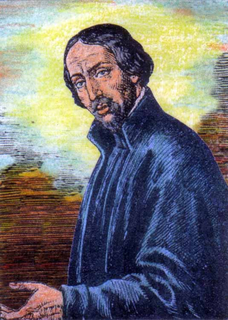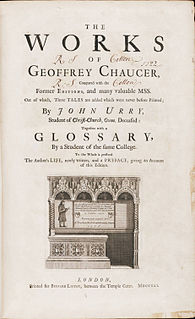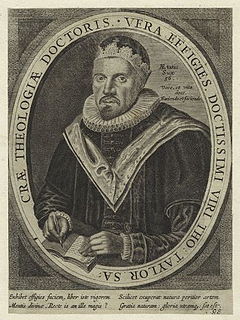
The words Popery and Papism are mainly historical pejorative words in the English language for Roman Catholicism, once frequently used by Protestants and Eastern Orthodox Christians to label their Roman Catholic opponents, who differed from them in accepting the authority of the Pope over the Christian Church. The words were popularised during the English Reformation (1532–1559), when the Church of England broke away from the Roman Catholic Church and divisions emerged between those who rejected Papal authority and those who continued to follow Rome. The words are recognised as pejorative; they have been in widespread use in Protestant writings until the mid-nineteenth century, including use in some laws that remain in force in the United Kingdom.

Frederick Oakeley was an English Roman Catholic convert, priest, and author. He was ordained in the Church of England in 1828 and in 1845 converted to Catholicism, becoming Canon of Westminster in 1852. He is best known for his translation of the Christmas carol Adeste Fideles from Latin into English.

Henry Morse was one of the Catholic Forty Martyrs of England and Wales.
Mark Aloysius Tierney was an English Catholic historian.

John Urry was a noted literary editor and medieval scholar of Scottish family.
Edward Sheldon was an English translator of four Catholic works. Two of them appeared in the troublesome period of the Stuart Restoration.
Richard Crakanthorpe (1567–1624) was an English Anglican priest, remembered both as a logician and as a religious controversialist.

Thomas Taylor (1576–1632) was an English cleric. A Calvinist, he held strong anti-Catholic views, and his career in the church had a long hiatus. He also attacked separatists, and wrote copiously, with the help of sympathetic patrons. He created a group of like-minded followers.
Nathaniel Spinckes (1653–1727) was an English nonjuring clergyman, the leader in the dispute about the "usages" which split the nonjurors of the "non-usagers",, against returning to the first prayer-book of Edward VI, as the "usagers", led by Jeremy Collier, advocated.
Theophilus Higgons (c.1578-1659) was an English Anglican divine and convert to Catholicism.
George Townsend was an English priest and author.
William Warmington was an English Roman Catholic priest, who sided with James I of England in the allegiance oath controversy.
Humphrey Leech was an English priest of the Church of England and Catholic convert, known as a Jesuit author.
Eugene Egan was a Catholic apostolic vicar in Ireland, designated bishop of Ross, County Cork, closely involved with the uprising of the Nine Years' War.
Andrew Sall (1612–1682) was an Irish Jesuit, later a convert to the Church of England.
John Griffith (1622?–1700) was an English General Baptist minister.
William Payne (1650–1696) was an English academic and cleric of the Church of England, known as a controversialist.
Richard Slate (1787–1867) was an English Congregational minister, known as a biographical writer.
Edward Hyde (1607–1659) was an English royalist cleric, nominally Dean of Windsor at the end of his life.
Emmanuel Lobb (1594–1671), pseudonyms Joseph Simons or Simeon, was an English Jesuit and dramatist. He is chiefly remembered for converting the future King James II to the Roman Catholic faith.




